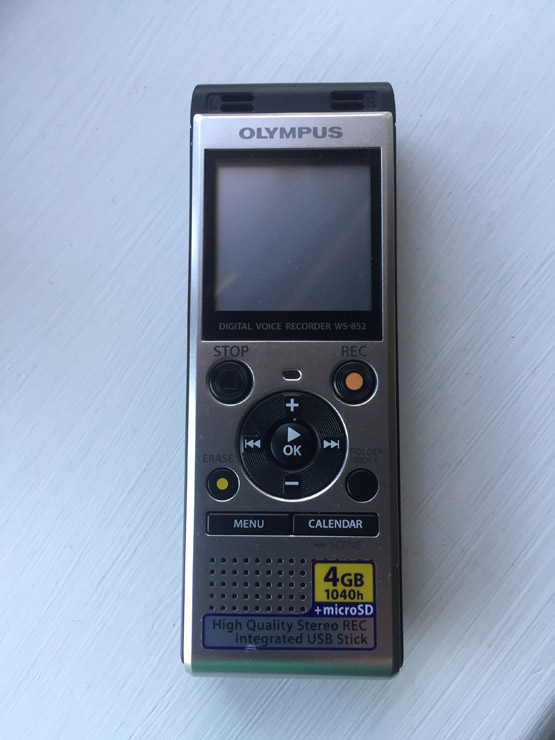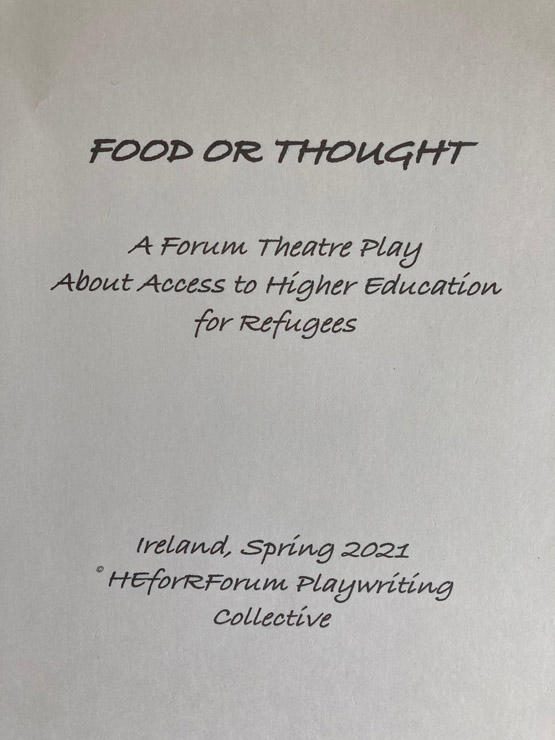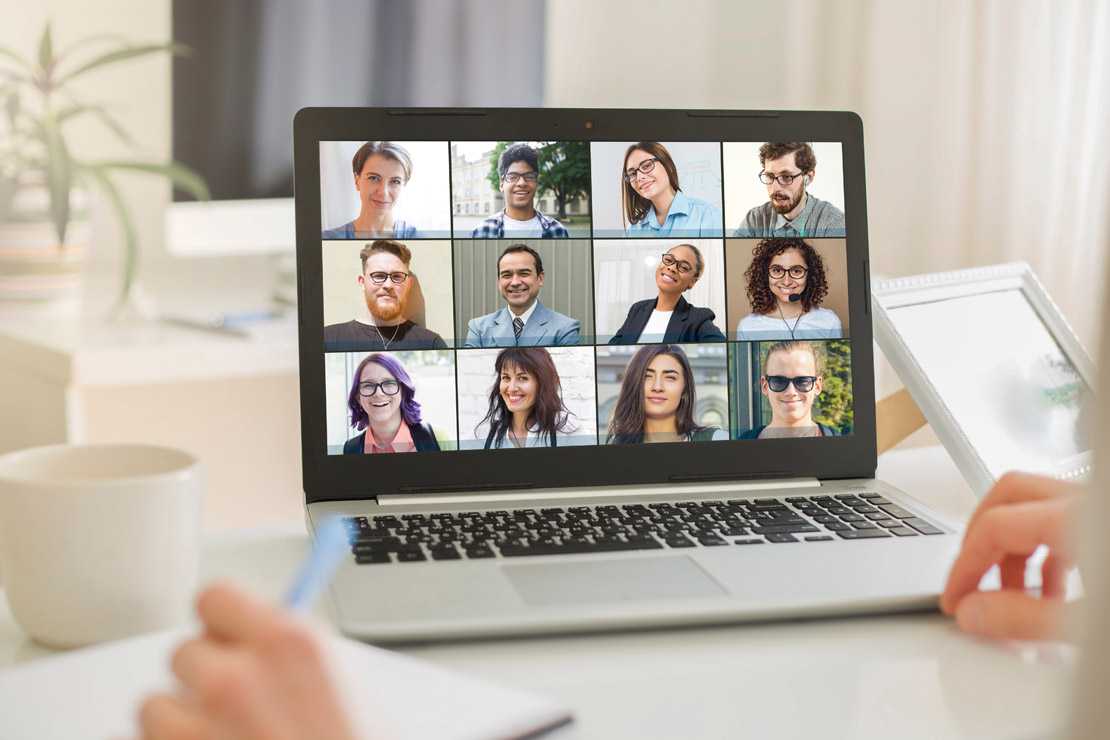Rebuilding bridges - The Elephant in the Zoom: Digitalising an MSCA project during the pandemic
Newsletter

In this contribution, I discuss how the pandemic has changed my daily routine as a researcher and how it has challenged me to find a different way to work.
Change of working patterns
When former Taoiseach, Leo Varadkar announced the closure of all schools, universities, and public places on the early evening of 12 March 2020, I was having crisps and a glass of wine in the office with another Marie Skłodowska-Curie Fellow after a long day at the university. We believed we would not be able to see each other for up to four weeks, maximum. My hypothesis was: when everyone stays at home for a month, the virus cannot spread, and it will disappear. In theory, this might have been correct, however in practice, as weeks went by, schools, crèches and universities remained closed, and infection rates and the death toll increased. It became clear that, at least in our household, we had to fundamentally restructure our daily routine.
Despite the praised flexibility of the Irish labour market, my husband had to work at home from 9-5 every day, by demand of his employer. This coincided with the nonavailability of my research participants during the daytime as most of them live in direct provision, the Irish accommodation system for refugees and asylum seekers. Therefore, while my husband had to work during this core time, I worked early in the morning, after 5pm, and on weekends. We have been in this mode ever since the pandemic started, until very recently.
So, what have I learned from this modus operandi?
1. Plan and structure every day, in particular the nice bits. Whereas I still have not recovered from the lack of sleep during this time, I am thankful for the fact that I got to spend so much more time with my son. We played and we tried activities together such as counting snails, chatting to boat owners along the canal close by, painting the street with chalk, and teaching my son to cycle on the - then deserted - parking space of a gym in just two days. Certainly, during the strict lockdown phases when we were allowed to walk only within a 5 km radius from home, it was challenging but we always felt privileged that we did not have to go out as many others, in particular those working in the health or retail sector.
2. Eat healthy and move, move, move, even if it is within the permitted 5 km radius – your research will benefit from it.
3. Do not plan several months or a year ahead. What counts is the here and now. In the current phase of the pandemic, when most countries face or are in the middle of a severe fourth wave, it is impossible to plan for future conferences, travels or job changes.
4. Look out for one another, not only in your family but also for elderly neighbours, and colleagues who live on their own, and make the most of the situation. I once found myself presenting an important talk to my 6-year-old son and my 80-year-old Irish neighbour (over the garden fence) as a mock run. I received very constructive comments, and half of a biscuit as a reward!
5. Most importantly, the digitalisation of our research projects should never lead to a 24/7 availability of ourselves or our research participants, collaboration partners, and colleagues. When we have to work at night or at 4 am, it is important to communicate to others that they are not expected to do the same! At my host university, it has become a policy to put a little note before or after your email signature that you might send or reply to emails outside the core working hours because of the pandemic but that you do not expect anyone to answer during these hours. This is something international offices of global universities have been doing for a long time due to the different time zones.
6. Surround yourselves with friends and colleagues who have an equally relaxed and sober view of the situation. In a pandemic (and we are still in the middle of it!), it is impossible to be as productive as before. Be honest about what is achievable and about what isn’t. Colleagues and friends will thank you for making a start!
Redesign of the research project
When it became obvious that working from home for all ‘non-essential workers’ would continue for much longer, my research project had to be redesigned considerably.
1. My secondment partner in Germany, the German Academic Exchange Service (DAAD), had closed its doors for the public during the first national lockdown in Germany, and most of its 1 000 employees were working from their homes. In addition, travelling from Ireland was virtually impossible, let alone travelling within Germany. I therefore had to digitalise my secondment, which took place as a combination of phone calls, zoom meetings and online workshops.

2. My research project consists of interviews with 51 refugee students, and an analysis of these interviews. The analysis formed the foundation for a theatre play. The draft screenplay was written by me and then students were supposed to join a collaborative playwriting process in workshops to give the play its final shape.
Needless to say, face-to-face interviews on campus were not possible anymore during Ireland’s long and relatively strict national and regional lockdowns.
I therefore drafted and submitted an amended ethics application which would allow for remote interviews. This amendment had several repercussions, such as, for example, the interviewee’s consent forms and signatures had to be digitalised too – a huge undertaking when your research participants live in direct provision where there is hardly stable Wi-Fi, let alone laptops, printers or scanners. Creativity and flexibility were needed at various levels.
Because of the schedule in direct provision and set mealtimes on the one hand, and no quiet or study room on the other hand, but roomsharing with 3-5 people for my interviewees, the only quiet times were very early in the morning and late at night. This meant that many interviews were conducted at 11 pm or later, or, on Sundays when participants had no (online) classes.
3. The theatre workshops and plays which are at the heart of my project could not happen yet, without a high vaccination rate and all participants being doubly vaccinated. So, while some aspects of a research project can be digitalised easily, others cannot. Theatre, especially, needs physical presence in a room and physical interaction. The collaborative playwriting which had to be done remotely, has been a cumbersome online process.

Pandemic consequences for refugee students
My research participants/interviewees have been challenged by the pandemic in various ways.
1. Room-sharing with other people, and a late reaction by the Irish government to the impossibility of physical distancing in shared accommodation have caused anxiety amongst them.
2. When the government finally reacted to the room situation of refugees and asylum seekers, participants were moved to a different accommodation without transparency or any prior notification. Sometimes, they were transported from the East coast of Ireland to the West, with no indication of how long they would stay in the new place.
3. It was extremely difficult for the research participants to keep up with their studies. Most of my interviewees had not owned a laptop, but just a prepaid phone. To follow six let alone eight hours of lectures daily on a phone in a place where there is unstable Wi-Fi was nerve-wrecking and demotivating.
4. The (legal) status decision for some of my research participants has been considerably delayed by the pandemic. Family unification applications had almost come to a standstill in 2020. The backlog remains huge.
My research participants have managed their deteriorated living and studying situation with such great resilience and endurance, and often a good bit of humour, that I can only express my deepest admiration for them. They had organised themselves, written official letters about the unacceptable standards of hygienic measures in direct provision and the impossibility to practice social distancing with several people in a small room. Together with NGOs, several initiatives were set up to fundraise for laptops so that residents in direct provision could continue to study and/or write job applications, and so that children in direct provision are not left out of their primary or secondary education.
Lessons learned during this great reset
Certainly, the pandemic has challenged and reshaped my research project. For instance, 17 months of the project (which is 24 months in duration) was during the pandemic and several lockdowns.
What I learned, thanks to the resilience, flexibility, creativity and optimism shown by my research participants, colleagues, and my family, is that research is possible even during a pandemic. It requires some redesigning of your research, and your daily routine, and to be open and transparent about it.
As we start to rebuild bridges in the great reset, we must be vigilant that the digitalisation of our research and its communication does not result in a lesser work-life balance: not for our research participants, our external collaborators, our colleagues, and certainly not for ourselves and our families.
Nina C Lueck
Sutherland School of Law,
University College Dublin, Ireland
nina.c.lueck@gmail.com